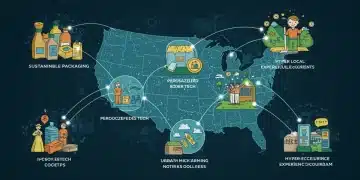Great Resignation’s Aftermath: Top 5 Entrepreneurial Opportunities

The Great Resignation’s aftermath has profoundly reshaped the US labor market, opening significant entrepreneurial opportunities by March 2025 in sectors addressing evolving workforce needs and consumer demands.
The profound shifts brought about by The Great Resignation’s Aftermath: 5 Entrepreneurial Opportunities Emerging in the US Labor Market by March 2025 are not merely statistical footnotes; they represent a fundamental restructuring of how Americans work, live, and consume. This seismic change has created fertile ground for innovative entrepreneurs ready to identify and capitalize on new demands and unmet needs. Understanding these evolving dynamics is crucial for anyone looking to launch or scale a successful venture in the coming years.
Understanding The Great Resignation’s Impact on Entrepreneurship
The Great Resignation, a widespread trend of employees voluntarily leaving their jobs starting in early 2021, has had far-reaching consequences beyond just job vacancies. It has fundamentally altered employee expectations, employer strategies, and consumer behaviors, thereby creating a landscape ripe for entrepreneurial innovation.
Millions of Americans re-evaluated their careers, seeking better work-life balance, higher compensation, and more purposeful roles. This exodus from traditional employment wasn’t just about quitting; it was often about starting something new, whether as a freelancer, a consultant, or a full-fledged business owner. This phenomenon has fueled a surge in new business applications, indicating a strong entrepreneurial spirit emerging from the disruption.
Shifting Workforce Dynamics and New Demands
The mass departure from conventional roles has highlighted several critical shifts, presenting clear opportunities for entrepreneurs. The demand for flexible work arrangements, skills development, and mental health support has skyrocketed. Businesses that can effectively address these evolving needs are poised for significant growth.
- Remote Work Solutions: The permanence of remote and hybrid work models requires new tools and services.
- Upskilling and Reskilling: A rapidly changing job market demands continuous learning and adaptation.
- Well-being Services: Increased awareness of mental health and work-life balance drives demand for supportive services.
Moreover, traditional industries are grappling with talent shortages, forcing them to rethink their operational models and often outsource specialized tasks. This opens doors for service-based businesses and consultancies that can fill these gaps efficiently and effectively. The entrepreneurial landscape is not just about new products but also about novel ways of delivering existing services.
In conclusion, the Great Resignation has acted as a catalyst, accelerating pre-existing trends and forging entirely new ones. Entrepreneurs who keenly observe these changes and respond with agile, value-driven solutions will find immense success in the transformed US labor market by March 2025. It’s a time for adaptability and innovation.
Opportunity 1: Flexible Work Solutions and Remote Infrastructure
The enduring shift towards remote and hybrid work models, largely catalyzed by the Great Resignation, has created a robust demand for innovative flexible work solutions and robust remote infrastructure. Companies are actively seeking ways to maintain productivity, foster collaboration, and ensure employee well-being in distributed environments.
This opportunity extends beyond simple video conferencing tools. It encompasses a broad spectrum of services and products designed to optimize the remote work experience, from specialized software to physical environment enhancements. Entrepreneurs can tap into this growing market by offering niche solutions that address specific pain points experienced by remote teams and their managers.
Expanding Beyond Basic Remote Tools
While basic communication platforms are ubiquitous, the market yearns for more sophisticated solutions. This includes project management tools tailored for asynchronous work, advanced cybersecurity measures for distributed networks, and virtual collaboration spaces that mimic in-person interaction more effectively. The focus is now on enhancing efficiency and engagement.
- Advanced Collaboration Platforms: Tools that go beyond basic chat to facilitate deep, creative teamwork.
- Cybersecurity for Distributed Teams: Specialized services protecting company data across various home networks.
- Remote IT Support: On-demand technical assistance for employees operating outside traditional office settings.
Furthermore, the physical aspects of remote work present entrepreneurial avenues. Ergonomic home office furniture, noise-canceling devices, and even subscription boxes tailored for remote worker wellness are gaining traction. Businesses that provide these tangible benefits can carve out a significant market share.
The demand for flexible work solutions also includes consulting services that help companies transition to and optimize hybrid models. This involves developing new HR policies, training managers in remote leadership, and implementing performance measurement systems suitable for a distributed workforce. The future of work is undeniably flexible, and entrepreneurs who facilitate this transition will thrive.
Opportunity 2: Upskilling and Reskilling Services for Evolving Jobs
The rapid evolution of technology and the structural changes in the labor market, exacerbated by the Great Resignation, have created an urgent need for upskilling and reskilling services. Many individuals are seeking to acquire new competencies to remain competitive, while businesses are struggling to find talent with the necessary modern skills. This dynamic presents a significant entrepreneurial opportunity.
Educational platforms, vocational training programs, and specialized bootcamps that focus on in-demand skills are experiencing unprecedented growth. Entrepreneurs can develop targeted curricula that address critical skill gaps, helping both individuals and organizations navigate the complexities of the modern workforce.
Targeting High-Demand Skills
Certain skill sets are particularly sought after across various industries. These often include digital literacy, data analytics, artificial intelligence, cybersecurity, and advanced project management. Providing accessible and effective training in these areas offers a direct pathway to market relevance and profitability.
- AI and Machine Learning Courses: Training for developing and implementing AI solutions.
- Cybersecurity Bootcamps: Intensive programs to protect digital assets.
- Data Science Certification: Courses in data analysis, interpretation, and visualization.
Beyond technical skills, soft skills like adaptability, critical thinking, emotional intelligence, and effective communication remain crucial. Programs that integrate both technical proficiency and essential soft skills will be particularly valuable. The market is moving towards holistic development, not just isolated technical training.

Moreover, specialized consulting for businesses to identify their specific skill gaps and implement customized training programs represents another lucrative avenue. Entrepreneurs can act as strategic partners, helping companies future-proof their workforce. The continuous need for learning and adaptation ensures a sustained demand for these services well into March 2025 and beyond.
Opportunity 3: Niche Consulting and Fractional Executive Services
As businesses grapple with post-Great Resignation challenges such as talent retention, organizational restructuring, and adapting to new market demands, the need for specialized external expertise has surged. This has opened a significant window for niche consulting and fractional executive services, allowing entrepreneurs to offer high-value knowledge without the commitment of full-time employment.
Many companies, especially small and medium-sized enterprises (SMEs), cannot afford full-time senior executives or specialized departments. Fractional executives and niche consultants provide access to top-tier talent on a flexible, project-specific, or part-time basis, offering cost-effective solutions for complex problems.
Specialized Expertise in High Demand
The Great Resignation highlighted critical gaps in leadership and specialized functions. Entrepreneurs with expertise in areas like HR transformation, digital marketing strategy, supply chain optimization, and change management are finding ample opportunities. These consultants can step in to provide strategic guidance and operational support, often on a temporary basis.
- Fractional HR Leaders: Guiding companies through talent acquisition and retention strategies.
- Digital Transformation Consultants: Helping businesses adapt to new technologies and processes.
- ESG (Environmental, Social, Governance) Advisors: Assisting companies in developing sustainable practices.
This model allows businesses to access highly experienced professionals without incurring the overhead of a full-time salary and benefits. For entrepreneurs, it offers the flexibility and autonomy often sought by those who participated in the Great Resignation, turning their expertise into a thriving business.
The rise of the gig economy for highly skilled professionals has further fueled this trend. Platforms connecting consultants with businesses are proliferating, but there’s also ample room for independent consultants to build strong personal brands and client networks. The ability to deliver tangible results quickly and efficiently is key to success in this entrepreneurial space.
Opportunity 4: Sustainable and Ethical Consumer Products & Services
The Great Resignation was not just about work; it was often a reflection of broader societal values shifting towards greater consciousness about environmental impact, ethical practices, and social responsibility. This cultural movement has significantly amplified consumer demand for sustainable and ethically produced goods and services, creating a robust market for purpose-driven entrepreneurs.
Consumers are increasingly willing to pay a premium for products that align with their values, from eco-friendly packaging to fair labor practices. Businesses that can genuinely demonstrate a commitment to sustainability and ethics, beyond mere greenwashing, are poised to capture a growing segment of the market.
Meeting the Demand for Conscious Consumption
This opportunity spans across various sectors, including fashion, food, personal care, and technology. Entrepreneurs can innovate by sourcing sustainable materials, employing transparent supply chains, and developing products that minimize environmental footprints. Certification and clear communication of ethical standards are paramount to building consumer trust.
- Upcycled and Recycled Products: Creating new value from waste materials.
- Locally Sourced and Organic Foods: Meeting demand for transparency and health.
- Ethical Fashion Brands: Offering clothing produced with fair labor and sustainable materials.
Beyond physical products, services that promote sustainability are also gaining traction. This includes repair services, sharing economy platforms for goods, and consulting for individuals or businesses looking to reduce their carbon footprint. The emphasis is on circular economy principles and responsible consumption.
The younger generations, in particular, are driving this trend, making purchasing decisions based on a brand’s social and environmental stance. Entrepreneurs who can authentically integrate these values into their business model from inception will not only attract customers but also build a loyal community around their brand. This represents a long-term shift, not a fleeting trend.
Opportunity 5: Mental Health and Well-being Support Services
One of the most profound revelations of the Great Resignation was the widespread acknowledgment of burnout, stress, and the critical importance of mental health in the workplace and in daily life. This heightened awareness has led to an explosion in demand for accessible, effective, and diverse mental health and well-being support services. This area presents a significant and growing entrepreneurial opportunity.
Individuals and organizations are actively seeking solutions that promote mental resilience, reduce stress, and foster overall well-being. Entrepreneurs can enter this space by offering innovative approaches to therapy, coaching, mindfulness, and corporate wellness programs.
Diverse Approaches to Well-being
The traditional model of mental health care is expanding, making room for a variety of complementary services. This includes digital platforms for therapy, personalized coaching for stress management, and corporate wellness programs that integrate mental health components. The key is to offer solutions that are convenient, destigmatized, and tailored to individual needs.
- Telehealth Mental Health Platforms: Providing virtual access to therapists and counselors.
- Mindfulness and Meditation Apps: Tools for daily stress reduction and focus improvement.
- Corporate Wellness Programs: Customized solutions for employee mental health support.
Furthermore, specialized coaching for career transitions, work-life integration, and leadership development, with a strong emphasis on mental well-being, is also in high demand. Many who left their jobs during the Great Resignation did so seeking a better quality of life, and these services directly address that aspiration.
The market for mental health and well-being is no longer a niche but a mainstream necessity. Entrepreneurs who can combine clinical expertise with accessible technology and empathetic service delivery will find a ready and growing client base. This opportunity is not just about profit, but also about making a tangible positive impact on society.
| Key Opportunity Area | Brief Description |
|---|---|
| Flexible Work Solutions | Services and tools supporting remote/hybrid work models. |
| Upskilling & Reskilling | Education and training for in-demand skills. |
| Niche Consulting | Fractional executive and specialized advisory services. |
| Mental Health Support | Services addressing well-being and stress reduction. |
Frequently Asked Questions About Post-Resignation Opportunities
The primary driver is the fundamental shift in employee expectations and employer needs following the Great Resignation. This includes a demand for greater flexibility, work-life balance, and specialized skills that traditional employment structures often struggle to provide, creating gaps for innovative businesses to fill.
To identify the best opportunity, consider your existing skills and passions, research market gaps within the listed areas, and conduct thorough competitive analysis. Focus on problems you can solve uniquely and effectively, aligning your solution with the evolving demands of the US labor market.
Yes, many of these opportunities are rooted in long-term shifts, not just temporary trends. The demand for flexible work, continuous learning, specialized expertise, and well-being support is expected to continue growing as the nature of work evolves and societal values prioritize these aspects.
Entrepreneurs might face challenges such as intense competition, the need for continuous adaptation to market changes, building trust in new service models, and securing initial funding. Effective marketing and a clear value proposition are crucial for overcoming these hurdles.
Technology is critically important across all these opportunities. It enables scalable solutions, efficient service delivery, broader market reach, and enhanced customer experience. Leveraging digital platforms and innovative tech tools will be key for entrepreneurial success in the post-Resignation era.
Conclusion
The Great Resignation has undeniably reshaped the US labor market, but within its aftermath lies a dynamic landscape of entrepreneurial potential. The five opportunities explored—flexible work solutions, upskilling services, niche consulting, sustainable products, and mental health support—are not merely fleeting trends but represent fundamental shifts in how we work, learn, and live. For aspiring and established entrepreneurs alike, understanding these evolving needs and responding with innovative, value-driven solutions will be paramount. By March 2025, those who strategically position themselves to address these new demands will not only achieve significant business success but also contribute to building a more resilient and adaptable economy.





